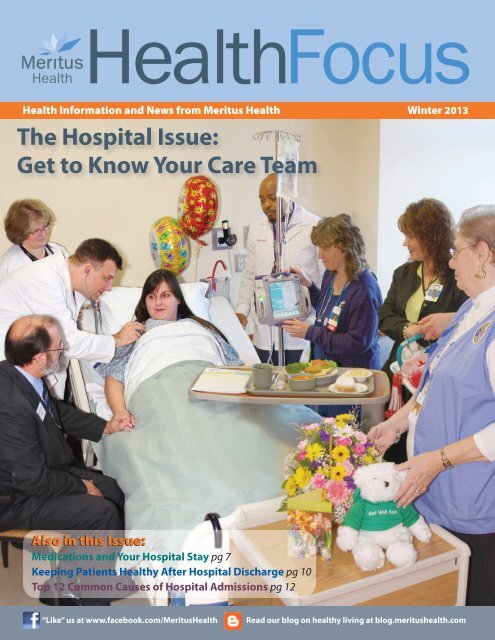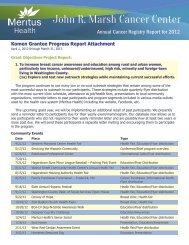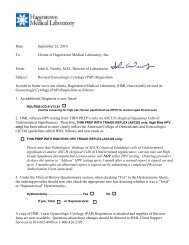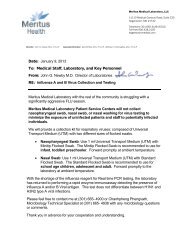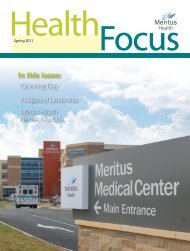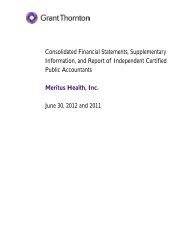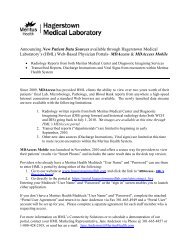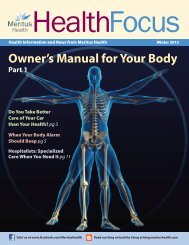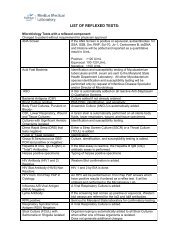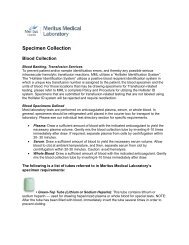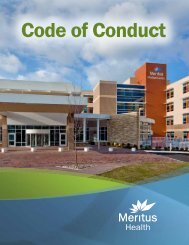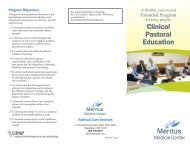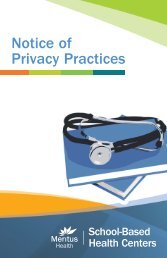Winter 2013 - Meritus Health
Winter 2013 - Meritus Health
Winter 2013 - Meritus Health
You also want an ePaper? Increase the reach of your titles
YUMPU automatically turns print PDFs into web optimized ePapers that Google loves.
<strong>Health</strong>Focus<strong>Health</strong> Information and News from <strong>Meritus</strong> <strong>Health</strong> <strong>Winter</strong> <strong>2013</strong>The Hospital Issue:Get to Know Your Care TeamAlso in this Issue:Medications and Your Hospital Stay pg 7Keeping Patients <strong>Health</strong>y After Hospital Discharge pg 10Top 12 Common Causes of Hospital Admissions pg 12“Like” us at www.facebook.com/<strong>Meritus</strong><strong>Health</strong>Read our blog on healthy living at blog.meritushealth.com
<strong>Meritus</strong> Medical Center is perhapsour most easily recognized facility, but<strong>Meritus</strong> <strong>Health</strong> offers much, muchmore. For generations, <strong>Meritus</strong> <strong>Health</strong>has been responding to the specificneeds of the region with the foresightof a true community partner bydeveloping and sustaining a totalhealthcare system. Branches of careincluding primary care physicianpractices, specialists in disciplinesfrom obstetrics to cardiology andsatellite services from diagnostics tohome medical equipment complementthe hospital’s efforts to providequality care.<strong>Meritus</strong> <strong>Health</strong> is not just a hospital.That said, the new <strong>Meritus</strong> MedicalCenter does offer cutting-edgetechnology and services for inpatientsand outpatients in a facility without acold, clinical feel. Care is provided by amulti-generational workforce fromaround our region–your friends andneighbors. Access to advanceddiagnostics, treatments and services isright here, delivered by competent andcaring, familiar faces.The quality services offered includea regional trauma center, a cardiaccatheterization lab, a stroke center, abariatric surgery center, a woundcenter and a nationally-recognizedjoint replacement program. Patientsseldom have a reason to go “down theroad” to receive excellent medical care.<strong>Meritus</strong> <strong>Health</strong> is the largest healthcareprovider in the region and serves as aleader in the continued evolution of acomprehensive approach to wellness inthe tri-state area and beyond.Featured<strong>Meritus</strong> <strong>Health</strong> LocationTotal Rehab Care atRobinwood Professional Centeroffers state-of-the art rehabilitative care.Expert therapists who are dedicatedto maximizing each and everypatient’s recovery make it the area’spremier rehabilitation provider.Specialized services include physicaltherapy, speech therapy, aquatic therapy,massage therapy and pediatric programs.Accepts all major insurances.For more information, call 301-714-4025
Fast Action Required for Stroke:CALL 911 F.A.S.TIf you think someone is having astroke, act F.A.S.T.FASTFACE:Ask the person to smile.Does one side of theface droop?ARMS:Ask the person to raiseboth arms. Does onearm drift downward?SPEECH:Ask the person to repeata simple sentence. Arethe words slurred?TIME:If the person showsany of these symptoms,call 911Stroke occurs when a blockage or burst blood vessel interrupts bloodflow to the brain.Within minutes, brain cells begin to die because theylack oxygen and nutrients. Stroke victims need to get to the hospitalimmediately by EMS transport to be evaluated and treated. The clot-bustingdrug tissue plasminogen activator or tPA is appropriate for some strokepatients, but must be given within three hours from the start ofstroke symptoms.Sudden onset is a telltale sign of stroke.If someone you know suddenly has trouble walking (loss of balance),seeing (blurred or blackened vision in one or both eyes) or speaking(slurred speech, inability to speak or confusion), call 911 right away.Other signs of stroke include weakness on one side of the body and anunexplained sudden and severe headache.Lower your risk.Most people, as they age, begin to have risk factors for stroke, especially highblood pressure and high cholesterol. Unhealthy lifestyle habits, particularlysmoking and poorly-controlled diabetes or high blood pressure, acceleratethe blood vessel damage that contributes to stroke. Even if you look goodand feel good, work with your healthcare provider to manage modifiablerisk factors including:• High blood pressure• High cholesterol• Overweight/obesity• Sedentary lifestyle• Diabetes• Smoking/Nicotine use• Alcohol abuse or illicit drug use• Heart disease• Atrial fibrillation (irregular heartbeat)• Estrogen or birth control pill use,especially in combination withsmokingDeciding Where to Go for Immediate CareUrgent and emergency care—they sound, well thesame. But when you are sick, knowing the differencebetween emergency and urgent care can spare you alot of anxiety.Emergency departments are designed for people with lifethreateningconditions—like heart attacks, strokes, severeburns, near-amputated limbs, head injuries and acute allergicreactions. The hospital setting provides immediate access tospecialized medical personnel, operating rooms, a blood bank,ventilators and countless medications.But sometimes that level of care is not needed. Earaches,nosebleeds, sprains and strains can be treated by theknowledgeable and caring medical professionals at <strong>Meritus</strong><strong>Health</strong>’s two Urgent Care locations. Our board-certifiedphysicians, nurse practitioners and physician assistantsprovide comprehensive care during extended hours, with noappointment necessary, seven days a week.Medical emergencies require the resources and servicesonly a hospital can provide, but when you are everyday-sickor have a minor injury, our Urgent Care centers can get youback on your feet.Quick Reference—Urgent Care vs. Emergency DepartmentMedical Condition Urgent EmergencyCare DepartmentCoughing and sore throatSeizures and convulsionsDrug overdoseUpper respiratory tract infectionLoss of consciousnessSmall bone fractures (toe or finger)Abdominal pain during pregnancyDifficulty breathingVomiting, diarrhea andstomachachesSudden numbness or weaknessin the face, arm or legSkin rashFever or fluXXXXXXXXXXXX<strong>Meritus</strong><strong>Health</strong>.com 5
Tips to Help You Prepare for SurgeryPreparing for surgery can be stressful, but approaching it as a team can ease anxietiesand set the stage for a better outcome. Doctors, surgeons and nurses appreciate patientswho get involved in their surgical treatment. “Rendering safe and efficient medical care isa team effort, and the patient is certainly an integral part of the team,” said EdwardDrawbaugh, M.D., medical director of perioperative services. “The more involved thepatient (and family) become, the better the ultimate result will be.”Gina A. Baker, RN, clinical manager of Same Day Surgery and Post-anesthesia Careat <strong>Meritus</strong> Medical Center offers these tips for a smooth and successful operation.1Learn as much as you can about yourprocedure. Meet with your surgeonand bring a list of questions about theprocedure, reasons for the surgery andrisks involved. Make sure to discuss yourtreatment plan and what you can expectafter discharge.2Tell your surgeon about all dailymedications and supplements that youare currently taking—and any allergies. A“pre-procedure” nurse will call youapproximately one week before surgery todiscuss your medical history and themedications you are taking.3Stop smoking one week priorto surgery and limit alcoholconsumption. Patients should not smokeor drink alcohol 24 hours before surgery.4Follow your doctor’s orders the dayprior to surgery—pay close attentionto when you should stop eating anddrinking. Your physician will recommendthe medications you need to take the dayof surgery and any bathing requirementsor special cleansers needed to helpprevent infections.5Prior to arriving for surgery, let thehospital staff or your surgeon know ifyou have any sudden changes in yourhealth (i.e. a respiratory infection orwound infection).6Bring a family member to the hospitalto be your second set of eyes and ears.7Remove nail polish, make-up andjewelry the day of surgery. Bring onlynecessary items to the hospital (glasses,contact lenses, dentures, insurance card,personal identification and a list of allmedications). Take only the medicationsyour surgeon or pre-procedurenurse instructed.8Ask about bodily markings to validatethe correct location of surgery.Typically, surgeons mark the surgical sitewith their initials prior to the patientleaving for the operating room.9Find out the type of anesthesia to beused (local, regional or general) andhow you will feel coming out of it.Know what happens during surgery.10 Monitors, for example, measureyour blood pressure, pulse and oxygenlevel. Sometimes a catheter is placed in thebladder to drain urine. Patients may begiven supplemental oxygen until they aremore awake.Set your expectations regarding11 pain, mobility, length of stay andbed rest post-surgery. Find out whetheryou will have dietary restrictions, requirespecial bandages and how many follow-upappointments are needed.The Top Five MistakesPatients MakePatients can delay or cancel surgeryby not following their healthcareprovider’s pre-surgery instructions.Here are the common mistakespatients make the day of surgery:1. Eating or drinking the day ofsurgery.This includes chewinggum and eating candy.2. Arriving late to surgery.3. Not taking medications asinstructed (i.e. blood pressuremedication) or not holdingmedications as directed.4. Not completing appropriate labor EKG testing prior to surgery.5. Not telling your surgeon ahead oftime about changes in yourcondition or new medications.6 <strong>Meritus</strong><strong>Health</strong>.com
Medications andYour Hospital StayWhether it is a planned hip surgery or a sudden fall, an inpatient stay atthe hospital requires patients and healthcare providers to have acomprehensive understanding of the medications you take. Carrie Adams,Pharm.D, directory of pharmacy at <strong>Meritus</strong> Medical Center, explains whyfull disclosure, asking questions and medication management arenecessary for a safe hospital stay and trip home.Carrie Adams, Pharm.DBefore Being Admittedto the HospitalKeep your medications in theiroriginal containers. Why? The labelon the bottle specifies the drug name,required dosage, expiration date, originalprescription date and prescribing physician.If you use a pill organizer, use amedication form to record theprescription label information.* Keepthe form handy in case of a medicalemergency and provide a duplicatecopy to a close family member.Include over-the-counter pills likeherbal and dietary supplements on yourmedication form. A supplement such asSt. John’s Wort (used for anxiety andmood elevation) can cause a druginteraction according to Adams.*www.meritushealth.com/news/pdfdb/medInfoCard2011redesignblue.pdfIf your hospital visit is planned, talk toyour primary care physician andspecialist about whether you shouldcontinue to take your prescribedmedications while in the hospital.During HospitalizationBring a completed medication form ora bag containing your medications intheir original containers to the hospital.According to Adams, a nurse uses yourmedication list or bottled prescriptionsduring a process called “medicationreconciliation.” Once your currentprescriptions are recorded, the nurse willask a family member to take yourmedications home. “Using hospitalprovideddrugs lets us maintain theintegrity and quality of the medications,”commented Adams. Nurses andpharmacists see patients mixing differentpills in the same container or storingmedications improperly.Always ask the nurse what, why andhow when receiving a newmedication. “It’s perfectly okay to askyour nurse what does this drug do, howmuch do I need and how often do I needit,” explained Adams. Patients can also askthe nurse for a drug information sheet.For improved patient safety, <strong>Meritus</strong>Medical Center uses barcode scanning toverify that the medication, dosage anddrug delivery method matches thepatient’s wristband and the data enteredinto the pharmacy computer system.Assign a family member to help keeptrack of the medications you receivewhile in the hospital. Adams explainsthat patients are often drowsy, forgetfulor confused while hospitalized. Familymembers can ask whether any newmedications were started since the lasthospital visit.Upon DischargeUnderstand the care plan. “Whenpatients and family members understandthe patient’s care plan—includingprescribed meds—compliance is higherand there’s less chance of an emergencyroom visit or hospital readmission,”said Adams. “Patients feel morecomfortable with their medication whenthey understand the why and how andany monitoring requirements,”continued Adams.Report any adverse drug effects toyour primary care physician right away.Refer to your prescription label forpossible symptoms. Some signs of druginteractions include (but are not limitedto) difficulty breathing, dizziness, itching,abdominal pain, skin rashes andsun sensitivity.<strong>Meritus</strong><strong>Health</strong>.com 7
Your Hospital Care Team“Hospital medicine is in the process of an evolution,” explained Mark Baran, M.D.,SFHM, medical director of hospitalist medicine at <strong>Meritus</strong> Medical Center.Due to the aging population needing more hospitalized care andefforts to curb healthcare spending, hospitals are shifting to amodel of efficiency and quality of care.Where once primary carephysicians shared time between the hospital and office,hospitalists now provide onsite 24/7 coordinated care. In manyrespects, hospitalists are the quarterbacks on a well-orchestratedhealthcare team.Hospitalists work closely with specialists and otherdepartments within the hospital—and with the patient’s primarycare physician. “Most patients and their families want to see adoctor immediately when their family member is sick,”saidMatthew Gibson, M.D. of Williamsport Family Practice.“Devotingas much time to my patients in the clinic, and working with ahospitalist for my admitted patients makes for good patient care.”“We can no longer afford a delay in care,”explained Dr. Baran.“Medicine today is about a team effort where there are seamlesshandoffs from one healthcare provider to the next.” Throughevidence-based research and process improvements, <strong>Meritus</strong>Medical Center has identified a healthcare team that isresponsible for your inpatient care.Emergency Room physicians diagnose andprovide non-surgical treatment of diseasesand injuries to patients in the emergencyroom.They are capable of diagnosing andcaring for all types of patients, regardless ofage or type of problem.Hospitalists are doctors who are exclusivelydedicated to caring for patients in the hospital,which makes them easily accessible andresponsive to patients’ needs.Specialists are doctors who have advancedmedical training in areas such as cardiology,pulmonology, oncology, gastroenterology,neurology and gynecology.Nurses care for patients around the clock.They have a wide range of skills and areusually in charge of implementing the careplan prescribed by the patient’s doctor.Theyare trained to administer medication, monitorside effects and educate patients on themedications they are receiving.Dietitians assess patients’ special nutritionalneeds and recommend the best diet tohelp the body recover after illness, traumaor surgery.Social workers help patients and theirfamilies deal with the psychological,emotional and social issues related to injury,hospitalization and after-hospital care.Theyassist with referrals to hospital resources,community agencies, medical coveragesupport, counseling, transportation anddisability assistance.Care managers are nurses responsible forpatients’ care coordination and the quality andefficiency of care.They are instrumental in themanagement of a patient’s hospital stay andimplementing a successful discharge.Pharmacists are experts in medicationtherapy.They fulfill physicians’ orders formedications and carefully review patients’allergies and other prescriptions that patientsare taking.Rehabilitation specialists (physical,occupational, and speech therapists) helppatients recover and adapt from illness,trauma or surgery.They design and implementtherapeutic programs so that patients cansuccessfully re-enter the community.Allied health professionals carry out specifictests, treatments and services.They includeoperating room technicians, emergency roomtechnicians, radiology technicians, EKGtechnicians and phlebotomists.8 <strong>Meritus</strong><strong>Health</strong>.com
KNOW YOUR HEALTHCARETEAM COLORSDo you remember when nurses wore crisp white nursing uniforms, white stockings and a starched hat? Back in the day,dress was uniform and jobs were obvious. But over time, standard uniform colors have become a thing of the past. In aneffort to provide patient and family-centered care, color-coded uniforms are making a comeback at <strong>Meritus</strong> MedicalCenter. Now patients can identify caregivers and support staff at a glance and understand their role in patient care.Here’s your guide to who’s who at <strong>Meritus</strong> Medical CenterPhysiciansWhite lab coats orlight blue scrubsRegistered Nurses and LPNsNavy, white or combinationof the two colorsCertified NursingAssistants and ED TechsMaroonTransportCranberry with ID tagindicating “Transport”Radiology TechniciansRed, black or combinationof the two colorsLab TechniciansLime green and blackInpatient PharmacyEggplant purpleEnvironmental ServicesCaribbean bluePhysical, Occupational andSpeech TherapistsAqua blue or lavenderRespiratory TherapistsGray or blackFacilities/EngineeringLight blue shirts with<strong>Meritus</strong> logo and navy pantsEmergency Department ScribesNavy polo shirts with aScribeAmerica embroidered logo<strong>Meritus</strong><strong>Health</strong>.com 9
KEEPING PATIENTS HEALTHYAfter Hospital DischargeMost of us don’t want a return trip to the hospital—we want aone-way ticket out. But sometimes patients leave the hospitalwithout a clear understanding of their diagnosis, changes totheir medications and diet, follow-up appointments with providers andhow to care for themselves post-hospitalization. Studies show that ifpatients do not see their primary care physicians within seven days ofhospital discharge, there is a strong chance they will be back in theemergency department or readmitted.While the traditional hospital philosophy is to rehabilitate patientsduring their stay, <strong>Meritus</strong> Medical Center is helping patients maintaintheir health post-discharge and avoid future hospitalizations. Here ishow our medical professionals are doing it.Care managers in the emergencydepartment. Our ED care managers areregistered nurses who educate patients ondisease prevention, disease managementand access to primary care physicians andcommunity resources. They arrangeoutpatient services and make follow-upphysician appointments for patientsdischarged from the ED and helptransition patients admitted to thehospital to the right nursing unit.Patient education. Throughout thehospital stay, patients and their familiesreceive education on the patient’sdiagnosis and treatment plan. Nurses askspecific questions checking for patients’understanding of their conditions andcomprehension of steps required oncepatients leave the hospital.10 <strong>Meritus</strong><strong>Health</strong>.comDischarge planning. Discharge planningbegins at admission! Our social work andregistered nurse care managers workwith physicians, including hospitalists(hospital-based doctors), to coordinatefollow-up tests, outpatient services,doctor appointments, medications,transportation and home nursing needs.Discharge prescription delivery at thebedside. Beginning in <strong>2013</strong>, Home CarePharmacy will offer a new service todeliver prescription medications neededat home to the hospital room of patientsprior to discharge. This convenient servicewill help ensure patients have in hand themedications they need to promote healingand health. Studies show that medicationsare the number one cause for readmissionsto the hospital. Providing our patientswith the appropriatemedications prior todischarge will improvethe health outcomes ofour community.Discharge AdvocacyCenter. Nurses from thedischarge advocacy centercall patients to ensurethat dischargeinstructions areunderstood and beingfollowed, check for anychanges in condition,explain post-discharge test results andmake physician follow-up appointments.Nurses from the discharge advocacy centeract as a safety net and continue to assesshow the patient’s care and health is beingmaintained and improved once he/sheleaves the hospital.Home <strong>Health</strong>. <strong>Meritus</strong> Home <strong>Health</strong>plays an important role in patients’recuperation after their hospital visit.Nurses continue home treatment forchronic conditions like pneumonia andcongestive heart failure, care for woundsand help with intravenous lines. Home<strong>Health</strong> nurses also assess patients’understanding of when and how to takemedications, their purpose and sideeffects. They provide invaluable educationto the patient on diseases and how theycan manage conditions at home.Today’s healthcare is becomingmore about preventative careand building partnerships thatencourage care coordinationand patient-centeredness.
YOUR HOME RECOVERY PRIORITIESAs a patient, you own a part of the discharge “to do” list. To preventillnesses from recurring and avoid a return trip to the hospital,follow these simple guidelines.to hear the information several timesbefore it registers.Ask about home medical equipmentand home adjustment requirements.Do you need a walker or oxygendelivered before you arrive home? Doesthe bedroom need to be relocated tothe main level of the home?Know the warning signs. Whatchanges in your condition shouldprompt a call to the doctor’s office?Find out what is normal and not sonormal before leaving the hospital.Learn as much about your conditionas possible. Use recovery time toresearch your condition and askquestions at upcoming doctorappointments.Rest. If there is ever a time to take naps,it is after you’ve been discharged fromthe hospital. Understand that it takesenergy for your body to heal aftersurgery, illness or trauma.Get a lay of the land. Use a simpleform by the U.S. Department of <strong>Health</strong>and Human Services to understandbetter the nature of dischargeinstructions. Go to www.ahrq.gov/qual/goinghomeguide.pdf or have afamily member bring the form tothe hospital.Ask for clarification. If you don’tunderstand the instructions, ask yourhealthcare provider to sit down andexplain it to you (or a family member)in a way you understand.You may needFill prescriptions right away. Whetherusing an in-hospital delivery service ordrive-through pharmacy, get themedications you need to stay healthy.Make follow-up appointments withdoctors, specialists and therapists rightafter discharge.Don’t go it alone. Lean on family andfriends for help cooking, bathing,organizing medications and runningerrands.Your medical condition mayrequire short-term help from a skilledhome health nursing service.New to <strong>Meritus</strong> <strong>Health</strong>Mohammed Bilgrami, M.D. recently joined<strong>Meritus</strong> <strong>Health</strong> and WillowWood Adult Medicine.Board certified in internal medicine andinfectious disease, Dr. Bilgrami’s interests includecommunity-acquired infections such as pneumonia,osteomyelitis and Lyme disease. In the hospitalsetting, Dr. Bilgrami plans to work with cliniciansin managing a variety of infections, specifically preventing the spreadof potentially infectious pathogens like Methicillin-resistantStaphylococus aureus (MRSA) and Clostridium difficile (C.diff).Dr. Bilgrami received his medical degree from Shri B M PatilMedical College in Karnataka, India, and completed his residencyat Mount Sinai Medical Center in New York City. Most recently,he finished a fellowship in infectious disease at Loyola UniversityMedical Center in Chicago, Illinois.Neurosurgeon Peter Campbell, M.D., recently joinedthe physicians and clinicians at Parkway Neuroscience andSpine Institute in Hagerstown. Dr. Campbell is a memberof <strong>Meritus</strong> Medical Center’s trauma team.Dr. Campbell completed an internship and hisneurological surgery residency at Thomas JeffersonUniversity in Philadelphia. During his seven years there,he regularly treated a wide variety of pathology including spinal cordinjury, degenerative scoliosis, pharmacoresistant epilepsy andcerebrovascular disorders.Dr. Campbell also specializes in minimally invasive spine surgeryincluding laminectomy, diskectomy, instrumented fusions andballoon kyphoplasty.Dr. Campbell is a member of the American Association of NeurologicalSurgeons and the Congress of Neurological Surgeons and a member of theAmerican Medical Association. He is board eligible with the AmericanAssociation of Neurological Surgeons.<strong>Meritus</strong><strong>Health</strong>.com 11
1Pneumonia2Septicemia3Depressive4Chronic5Acute6AtrialTop 12 Causes ofHospital AdmissionsFrom serious, life-threatening conditions to disorders that cannotbe treated in an outpatient setting, <strong>Meritus</strong> Medical Center trackswhy patients are admitted from the emergency department to thehospital. Here are the twelve top conditions that can land you in thehospital and ways to avoid the visit.7Strokeis an inflammation ofthe lungs caused by infection and acommon condition for why peopleare admitted to a hospital. Otherconditions like diabetes, stroke andflu can predispose you to pneumonia.or sepsis is a severeblood infection that causes widespreadbodily inflammation. Theelderly, infants, people withcompromised immune systems,people previously hospitalized andthose with diabetes are at risk for sepsis.disorders interfere witha person’s ability to work, sleep, study,eat and enjoy once-pleasurableactivities for weeks or longer.Alcohol or drug use, certain medicalconditions, stressful life eventsand some medications can bringabout depression.obstructive pulmonarydisease is an umbrella term used forchronic bronchitis, asthma andemphysema. Smoking is the mainculprit behind COPD.kidney failure happens whena person’s kidneys stop functioning.There are many causes of kidneyfailure including sepsis, severedehydration and kidney damage frommedicines, poisons and infections.fibrillation or AFib is anirregular or rapid heartbeat and cancause a sudden drop in blood pressureor lead to a stroke or cardiac arrest.Alcohol abuse, high blood pressure,coronary artery disease, prior hearttrouble, medications and anoveractive thyroid gland cancontribute to AFib.8Acute9Heart101112occurs when the flow ofoxygen-rich blood to a portion ofthe brain is blocked. Factors likehigh blood pressure and highcholesterol, smoking, diabetes andobesity can raise your risk of havinga stroke.respiratory failure occurswhen not enough oxygen passesfrom the lungs to your blood.Events such as trauma, sepsis, drugoverdose and fluid entering thelungs (aspiration) can provokeacute respiratory failure.attack happens when theflow of oxygen-rich blood to asection of heart muscle suddenlybecomes blocked. Managing yourdiabetes, blood pressure andcholesterol, exercising more andeliminating tobacco use can reduceyour risk of a heart attack.Urinary tract infection in mostcases is an infection of the lowerurinary tract—bladder and urethra.Diabetes, not drinking enoughfluids, pregnancy and being afemale can increase your chances ofdeveloping a UTI.Chest pain. There are manypossible causes of chest pain; theyinclude heart attack, lung problems,panic attack, shingles, gastroesophagealreflux or GERD and gallstones.The majority of chest painpatients are transferred to <strong>Meritus</strong>Medical Center’s observation unit.Pulmonary embolism is caused bya blood clot that travels to the lungfrom a vein in the leg. A history ofdeep vein thrombosis or DVT, recentsurgery, required bedrest, highblood pressure and smoking put youat risk for a pulmonary embolism.About<strong>Health</strong> Focus<strong>Health</strong> Focus is published bythe corporate communicationsdepartment of <strong>Meritus</strong> <strong>Health</strong>.Mary Stuart RizkExecutive DirectorCorporate CommunicationsNicole JovelEditor/Communications ManagerJoelle Butler, Assistant EditorBetsy Maymon, Graphic DesignKyle Haught, Shelly Crate andRyan Smith, PhotographyAnne Gill, WriterIf you have ideas, commentsor suggestions for future<strong>Health</strong> Focus articles, emailNicole.Jovel@<strong>Meritus</strong><strong>Health</strong>.com,call 301-790-8692, or sendthem to:<strong>Meritus</strong> <strong>Health</strong>Corporate Communications11116 Medical Campus RoadHagerstown, MD 21742This publication in no way seeksto diagnose or treat illness orto serve as a substitute forprofessional medical care. Pleasesee your physician if you have ahealth problem.Looking for a doctor?Visit <strong>Meritus</strong> <strong>Health</strong>’s free service,<strong>Health</strong>lineat <strong>Meritus</strong><strong>Health</strong>.com/<strong>Health</strong>lineSearch by doctor name,practice name or medical specialty.For personal assistance,call 1-800-920-3627Monday-Friday, 9 a.m.–4 p.m.<strong>Meritus</strong><strong>Health</strong>.comwww.facebook.com/<strong>Meritus</strong><strong>Health</strong>blog.meritushealth.com


